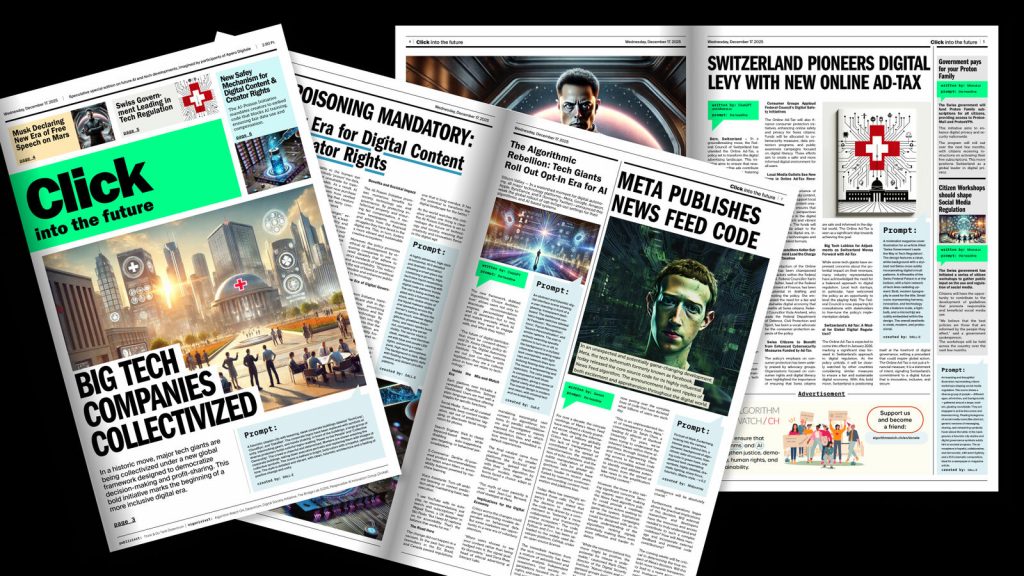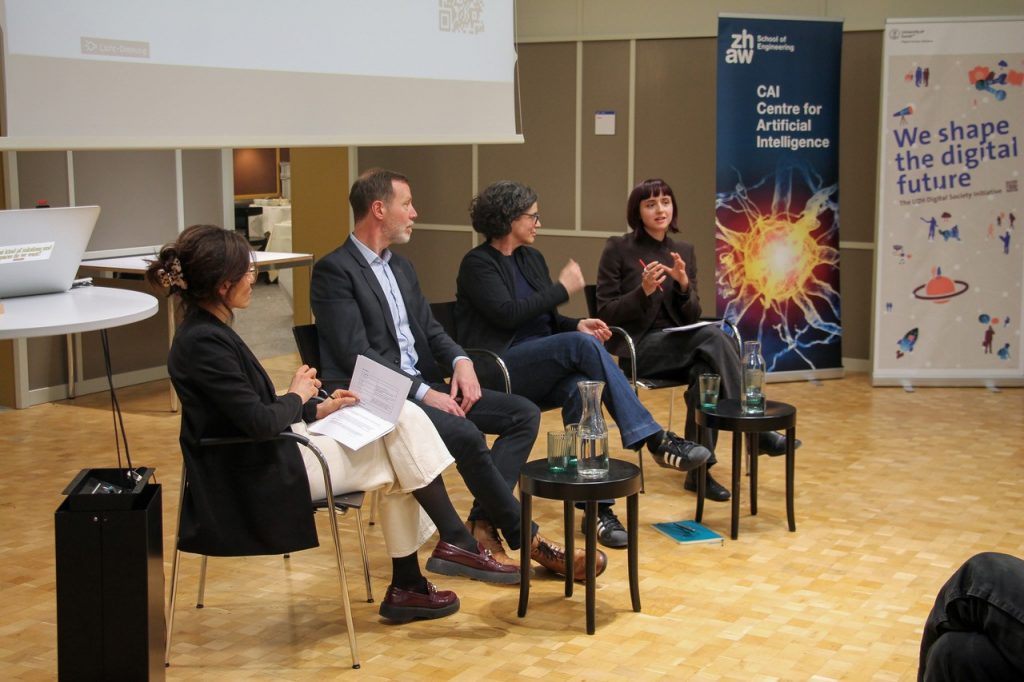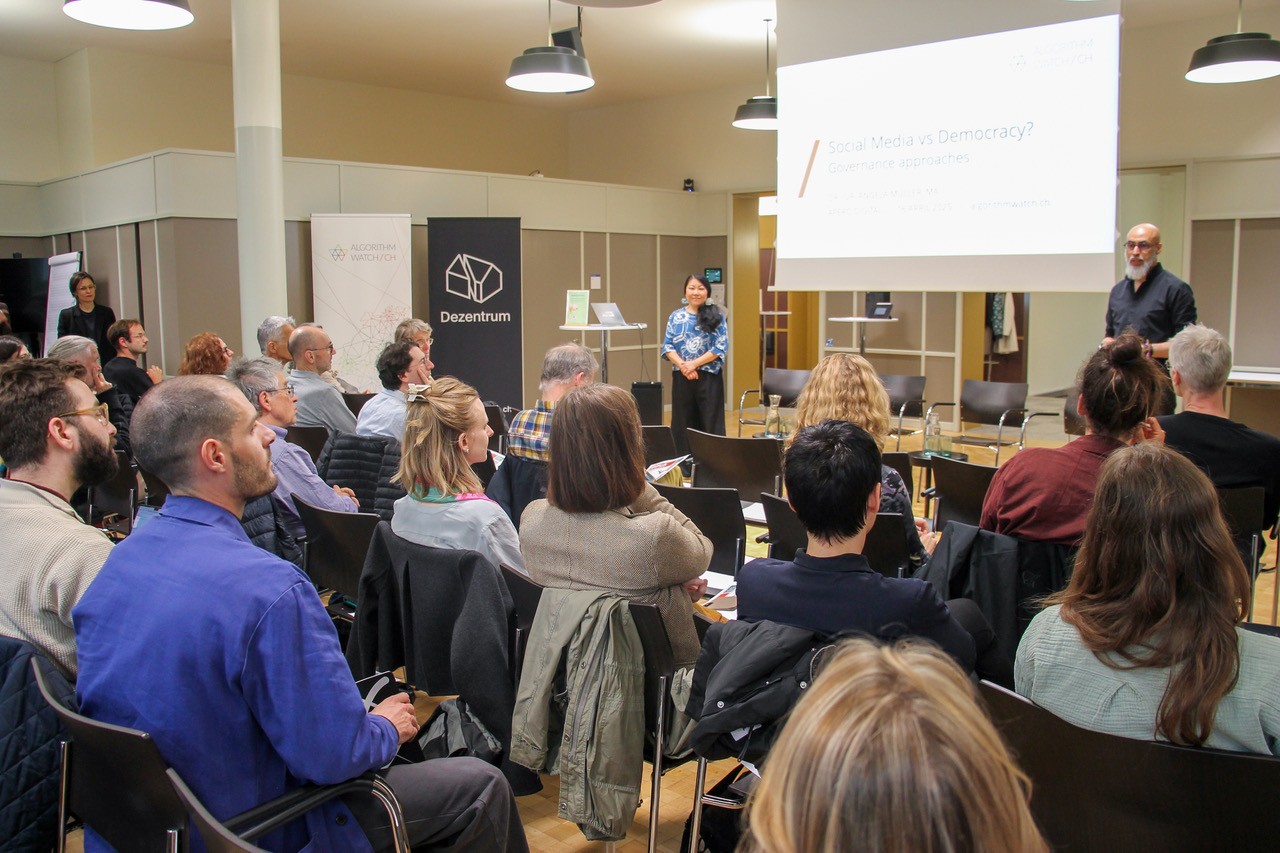While the regulation of social media providers and other digital platforms is postponed in Switzerland, the discussion is not. Read about the eventful and timely discussion on “The Algorithm Resistance” from the fourth “Apéro Digital”.
It is the year 2026. Citizens around the world can meet online on open, transparent, ethical social media platforms. Unlike today, behind them are not giant tech companies with biased algorithms, but independent, non-profit actors.
The event “The Algorithm Resistance – Writing the Rules for Social Media & AI in Public Debates” ended with future scenarios like these. After discussing the impact of algorithms on democracy – quite a timely topic, as the Federal Council postponed the planned regulation of large communication platforms (possibly due to geopolitics), a room full of interested people scribbled down potential future headlines on this topic. And dreamt big. Here is a compilation: “Click into the Future”.

Let us take a step back. Which insights did Alexandra Stark (CH Media), Thomas Häussler (Federal Office of Communications (OFCOM)), Angela Müller (AlgorithmWatch CH), and Jeannie Schneider (Dezentrum) share at the event? Time to dive into some of the main topics:
Social Media Algorithms vs. Generative AI
In the title of the event and this blog, you come across the term “algorithms”. But what exactly are algorithms, and how do they differ from other AI systems, like generative AI?
Technically, social media platforms use different AI algorithms. Some algorithms are used to rank and recommend content – they often track what you do online and infer what content you personally might like on the platform. “Social media platforms frequently employ neural networks to recommend content that matches user preferences.” (Taherdoost).
Generative AI, on the other hand, uses large neural networks models trained on vast datasets to create human-like outputs. This new (and not always factually correct) content is sometimes shared by users on platforms. Both types of algorithms are AI models, need data as input, but have different functions and outputs.
Impact of AI on democracy
How can AI on social media platforms influence democracy? In the last media revolution (radio and TV), the European approach was to make content for the public, non-profit. With internet platforms and AI, this approach is now lacking, said Thomas Häussler. While social media platforms can facilitate political discussions, forge connections, and political involvement, it is necessary to look at potential risks due to vested interests of private companies. The panelists pointed out that, instead of focusing on the public, some of today’s main actors focus on their own profit and launch algorithms to that effect. These algorithms encourage users to stay on the platform for as long as possible.
Research shows that “[…] the specific functioning of selective algorithms may foster polarization of opinions and biased decisions […]” (Rodilosso). Studies also show that “[…] it is easy to detect the political affiliation of individuals using social media with high accuracy […] and it can undermine democracy” (Kahn). In the past, undecided voters were targeted by political campaigns or fake news to sway them to one side or intimidate them because of their personal views or identity.
With generative AI, there is a risk of users sharing posts that are not correct but look deceivingly realistic. Deepfakes can be posted on purpose to cause harm (disinformation) or without bad intent (misinformation). This means that users need to check facts and try to recognise fakes or synthetic users (bots) that can possibly influence them.
Regulation in EU and Switzerland
The European Union has introduced several legislative acts to govern the digital space, including the Digital Services Act (DSA), the Digital Markets Act (DMA), and the General Data Protection Regulation (GDPR). The DSA, for example, requires online platforms and search engines to take active measures against harmful or illegal content, including disinformation, and to increase transparency and accountability regarding algorithmic recommender systems, which influence the content users see. The table below compares the different EU acts and regulations.
In Switzerland, regulations address illegal content such as hate speech and defamation, which are punishable under the law. However, misinformation and disinformation are generally not considered illegal and are therefore not directly regulated or enforceable.
| Regulation | Main Purpose | How Users Are Affected |
| General Data Protection Regulation (GDPR) | Protect personal data and increase legal certainty | See consent pop-ups, manage data rights (access, delete), stricter privacy policies |
| ePrivacy Directive – known as the «cookie law” | Ensure privacy in electronic communications | See cookie banners, consent for website tracking |
| Digital Services Act (DSA) | Create a safer online environment with more accountability | Better content moderation, reporting tools, info on why certain posts are shown |
| Digital Markets Act (DMA) | Make the markets in the digital sector fairer and more contestable | More app choices, less bias toward “default” services |
| EU AI Act | Regulate AI based on risk and ensure safety and ethics | Protected from harmful or deceptive AI |
Key Messages from the Panelists

The panelists emphasized that civic literacy is just as important as digital literacy. Citizens need the skills to critically engage with digital platforms, but responsibility cannot rest solely on individuals; companies must also be held accountable.
Regulation plays a crucial role, particularly in contexts like Switzerland, where existing laws are often difficult to enforce. However, governance is not limited to regulation alone; it also involves building a comprehensive framework – the latter is where scholars and researchers can meaningfully contribute.
This also points out an urgent need to conduct more research in Switzerland and other countries, as current research has predominantly focused on the U.S.. When studies demonstrate a positive or negative impact of current practices, scientific, journalistic, and non-profit organisations can raise awareness, enabling politicians and citizens to engage in informed discussions and decision-making.
For more details, read the insightful summary of the main points of the discussion (in German) by Franziska Oehmer-Pedrazzi and have a look at the artifact:
Additional resources:
- Die Cookiefalle 1/4: Der Pakt mit dem Werbeteufel – Audio & Podcasts – SRF
- Save Social – Soziale Netzwerke als demokratische Kraft retten
- Spekultative Zeitung “Algorithm Resistance” – DIZH
Sources:
- Khan, I.U., Khan, M.U.S. Social Media Profiling for Political Affiliation Detection. Hum-Cent Intell Syst 4, 437–446 (2024). https://doi.org/10.1007/s44230-024-00078-y
- Rodilosso, E. Filter Bubbles and the Unfeeling: How AI for Social Media Can Foster Extremism and Polarization. Philos. Technol. 37, 71 (2024). https://doi.org/10.1007/s13347-024-00758-4
- Taherdoost, H. Enhancing Social Media Platforms with Machine Learning Algorithms and Neural Networks. Algorithms, 16, 271 (2023). https://doi.org/10.3390/a16060271




